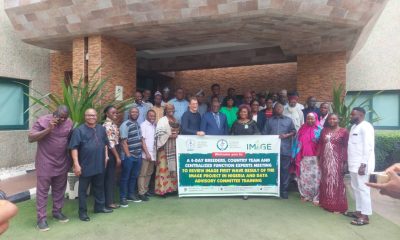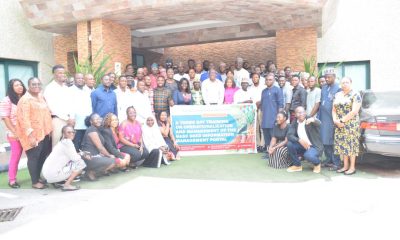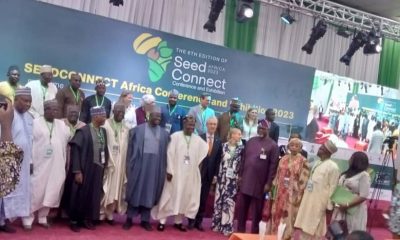Agriculture
NASC, Stakeholders converge for 2022 Seed Connect Africa Conference/Exhibition
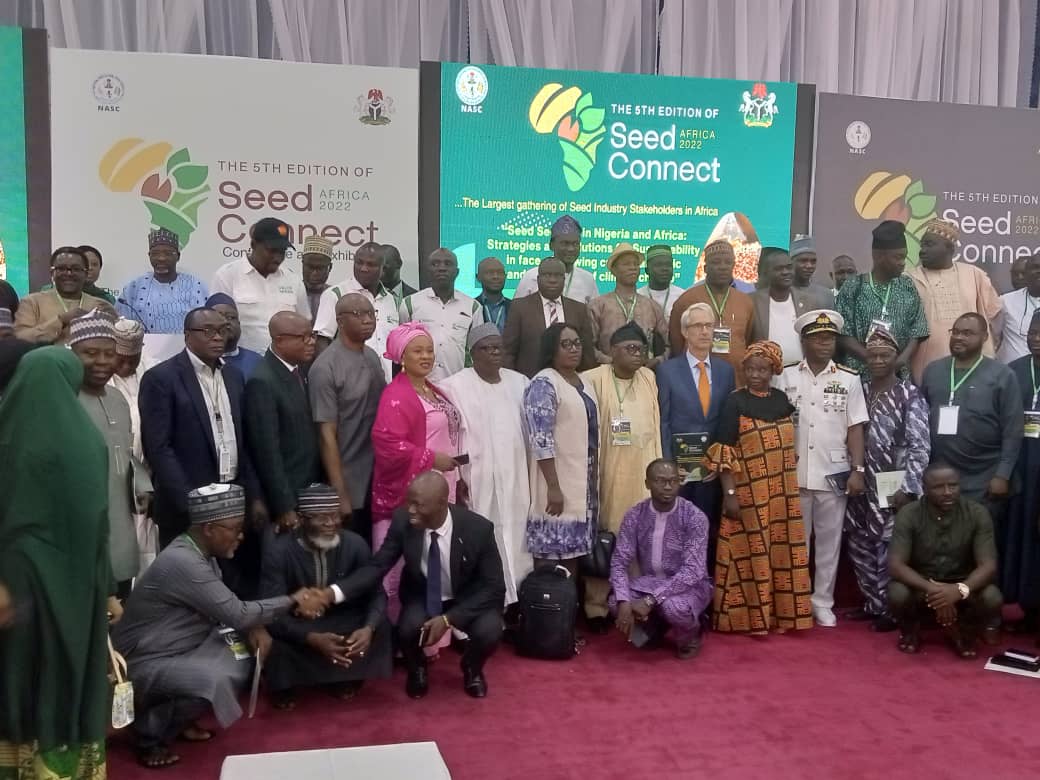
The National Agricultural Seed Council and other stakeholders in the seed sector around the world on Monday, converged for the fifth edition of the Seed Connect Africa 2022 conference and exhibition in Abuja.
The two days event organised by the National Agricultural Seed Council in collaboration with other partners, focuses on identifying and implementing strategies and solutions for sustainability in face of growing crisis, pandemic and challenges of climate change in the seed industry.
Seed Connect Africa conference/exhibition is the largest gathering of seed industry stakeholders in Africa yearly, that creates and provide a platform for seed networking between different countries while availing farmers a one on one interactional opportunities with seed companies.
Speaking, the Director General of NASC, Dr. Philip Ojo opined that the importance of SeedConnect Africa cannot be overemphasized as it brings together seed industry stakeholders from all over the world to discuss and deliberate on issues and topics of mutual benefits to seed system.
Ojo revealed that the SeedConnect Africa over the years gave way to the introduction of the Plant Variety Protection (PVP Act 2021) Law in Nigeria, a journey which according to him started fully in 2018 shortly after the first edition.
“I am happy to announce today, that Nigeria has a PVP Act and we are making efforts to complete the Nigerian membership of the International Union of Protection of New Plant Variety.
“We are currently doing a lot to operationalize this law, we have begun the process of setting up the PVP office, and currently we have a draft regulation that was reviewed and validated by experts.
“With our collaboration with the Nigerian Securities and Civil Defence Corps (NSCDC), we have been able to scale up seed market surveillance and enforcement of standards because we need to sanitize the Nigerian seed industry”, he noted.
Also contributing, the Head of Building Sustainable Seed System for Cassava (BASIC II), Professor Lateef Sanni disclosed that poor funding of the Agricultural Development Program (ADP) has weakened the extension advisory services for seed.
Professor Sanni who is also a Professor of Food Science and Technology stated that investment in extension advisory services will enhance the proper usage of seeds which will further enhance agricultural productivity.
“If you look at what World Bank did by setting up state Agricultural Development Program (ADP). They were the best tool to actually extend some of these technologies and best practices to farmers at the rural level.
“But unfortunately, we keep on reducing the funding to ADPs. For instance, we have about 1000 seed producers but for us to reach them, we have to make use of some of the ADPs and some private NGOs.
“So, the combination of those public and private extension advisory support is very important to reach millions of farmers, because it is one thing for you to plant high yielding disease resistant seed and it is another thing for you to use good agronomic practices or six steps in weed management.
“So, investment in extension advisory services is a key principle factor to enhancing our agricultural productivity as a nation”, he stated.
He however called on the Nigerian government to invest in agricultural Universities to have a seed technical hub, which he said will enhance the development of the country’s seed system.
Agriculture
South-West Cassava Farmers Enhance Skills Through AATF Training in Oyo
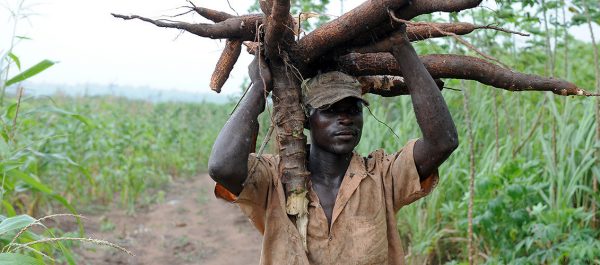
Approximately 1,000 cassava farmers and processors from the South-West region have participated in a training program focused on Good Agronomic Practices to enhance their skills in cassava farming and processing. This initiative was announced by Adeyemi Olojede, the Director of Tuber Crops Research at the National Root Crops Research Institute (NRCRI), during the program’s official launch at Fashola Farm in Oyo town, Oyo State.
Olojede noted that the program, organized by the African Agricultural Technology Foundation (AATF), aims to reach over 6,000 farmers, with particular emphasis on empowering women and youths. He expressed optimism that the initiative would significantly improve cassava farming and processing in Nigeria, equipping participants with essential skills to enhance their livelihoods through better production methods and increased value creation.
“This weeklong training, facilitated by the NRCRI, kicked off with the first batch of 1,000 participants, comprising farmers and processors,” he stated. The program is supported by the German Federal Ministry for Economic Cooperation and Development and implemented by Deutsche Gesellschaft für Internationale Zusammenarbeit GmbH in collaboration with AATF, Agridrive Ltd., and Clayuca Corporation.
Olojede revealed that this training marks the initial phase of a series expected to unfold over three years, with plans to train 1,000 participants in 2024, 2,000 in 2025, and 3,000 in 2026. The program will also include training for 1,000 processors, mainly women from Oyo and Ogun states, focusing on enhancing value addition in cassava processing.
Kehinde Jimoh, AATF’s Programme Officer for Agribusiness, emphasized that the initiative is part of the foundation’s broader commitment to boost the productivity of cassava farmers and processors. He highlighted that the training aims to empower participants with best agronomic practices and value addition strategies, which are expected to lead to significant improvements in their livelihoods and cassava productivity.
Jimoh also noted the importance of this training in not only boosting cassava production but also enhancing value addition, providing farmers with alternative income streams.
Agriculture
Wema Bank Shines at Global SME Finance Forum Conference Awards 2024
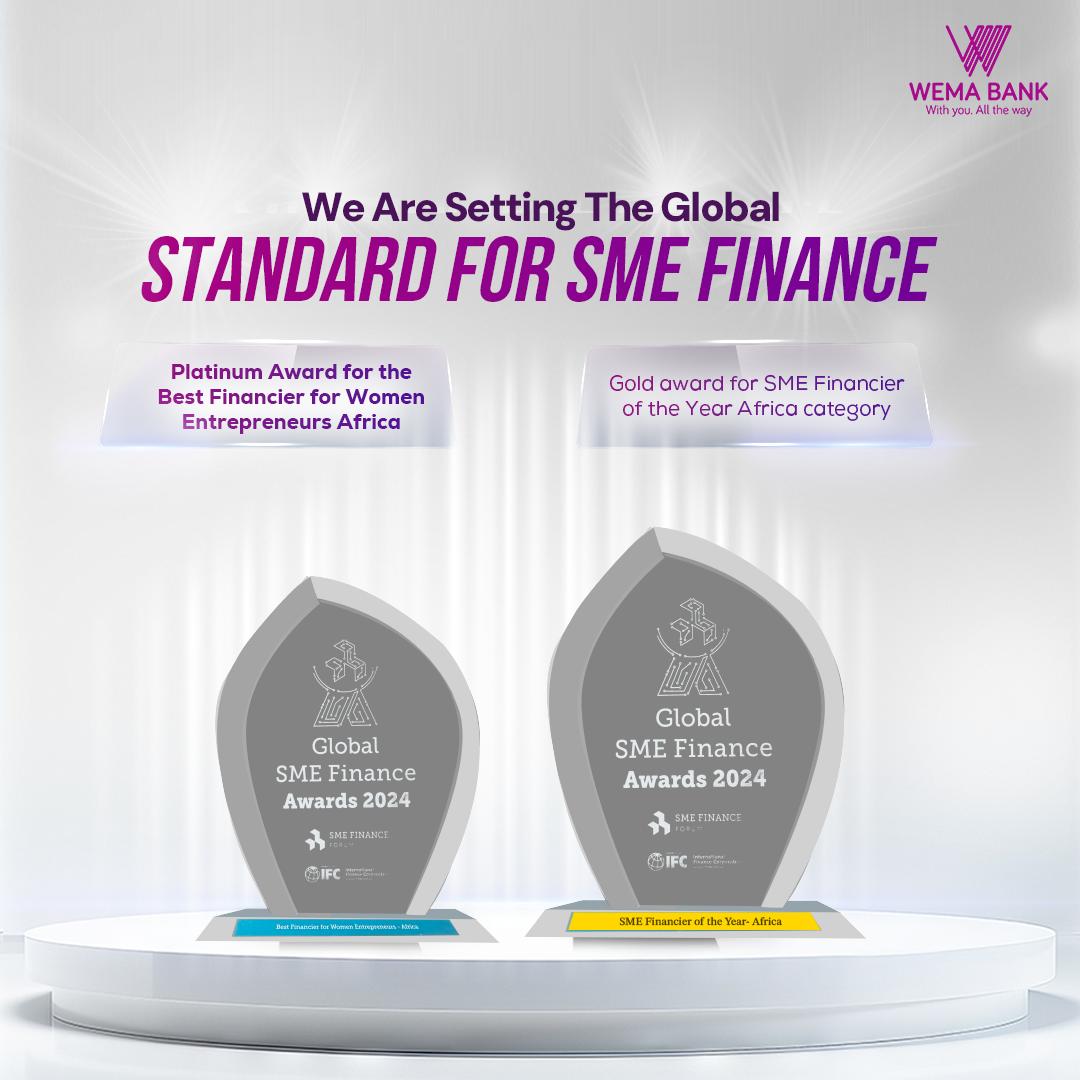
…Awarded:
• SME Financier of the Year (Africa)
• Platinum Award for Best Financier for Women Entrepreneurs (Africa)
Wema Bank, Nigeria’s foremost innovative bank and pioneer of Africa’s first fully digital bank, ALAT, has received two awards of excellence at the Global SME Finance Forum Conference Awards 2024 which held in São Paulo, Brazil between September 16 & 18, 2024. The awards received are SME Financier of the Year (Africa) and Platinum Award for Best Financier for Women Entrepreneurs (Africa).
The Global SME Finance Forum is the world’s leading, technically oriented and geographically diverse platform focused solely on scaling SME financing worldwide. Managed by this Forum, The Global SME Finance Forum Conference Awards is dedicated to acknowledging the effective and successful practices of financiers across the world, honouring the innovative products and services these financiers create for SMEs, recognising the impressive results in expanding finance and services to SMEs, and celebrating these exceptional financial institutions. Wema Bank emerged Africa’s top financier not just for the general SME landscape but also particularly for women-owned SMEs, at the 2024 edition of the annual Global SME Finance Forum Conference Awards.
Reputed as the Bank of choice for Micro, Small and Medium Enterprises (MSMEs), Wema Bank received recognition for its commendable track record of developing innovative, sustainable and significantly impactful products, services, solutions and opportunities for businesses of all sizes across Nigeria. The Bank’s impact ranges from affordable financing options and seamless payment collection solutions to access to market, digital solutions for efficient business operation and management, SME Advisory services, and a vast range of products tailored to the needs of businesses across every part of Nigeria. Through its women-focused proposition, SARA by Wema, Wema Bank continues to tailor its SME offerings specifically for women, helping these women build sustainable businesses and access the resources needed to scale and thrive. The Bank further supports overall growth and well-being of these women with affordable to free healthcare packages. It is beyond doubt that Wema Bank is indeed deserving of its recognition as Africa’s top financier for SMEs and particularly, women entrepreneurs.
Expounding on the Bank’s glaring commitment to empowering MSMEs, the MD/CEO of Wema Bank, Moruf Oseni, articulated the big picture for the Bank. “MSMEs make up the bulk of Nigeria’s economy and they are critical to not only mitigating unemployment and other macroeconomic challenges but also promoting innovation and significantly boosting the economy towards national development. At Wema Bank, we recognise the potential that MSMEs hold as well as the challenges that threaten the maximisation of this potential, and we have made a lifelong commitment to providing viable, seamless, accessible, affordable, reliable and effective solutions tailored to the needs of businesses of all sizes across Nigeria; especially women-owned businesses. There is a rising need for intentionally inclusive empowerment strategies in not only stimulating growth in the SME sector but also bridging the gap in gender equality, and we have undertaken the responsibility of fulfilling that need. As a Bank, our mission is to empower lives through innovation, and as always, we will continue to seek more effective ways to empower businesses for optimal productivity and sustainable growth”.
“We are honoured by the global recognition accorded to us by the Global SME Finance Forum and as we receive these awards, we reiterate our commitment to providing businesses with the resources they need and a bouquet of intelligent solutions that mitigate prevalent challenges and make business management and operation seamless, maximally profitable and efficient. Thank you to the Global SME Finance Forum for the acknowledgement, and also to our valued customers who continue to entrust the future of their businesses and their financial well-being in our hands. This prestigious recognition honours our unwavering commitment to empowering SMEs and fostering innovation in SME finance, further fuelling our drive to consistently go above and beyond in accelerating growth for SMEs and delivering optimum value to every stakeholder. We are indeed the Bank of choice for MSMEs and women across Nigeria, and we will never relent in empowering women to thrive and businesses to scale regardless of economic fluctuations”, Oseni remarked.
Wema Bank continues to raise the standards of banking and financial services in Nigeria, demonstrating a commitment to generating positive impact across diverse verticals, a dedication to exceeding expectations and a passion for empowering lives and businesses for success.
Businesses interested in accessing the Bank’s tailored range of finance options and business-centric solutions are encouraged to visit https://wemabank.com/smes or send an email to smehelpdesk@wemabank.com to get started.
Agriculture
Experts Call for Harmonization of Gene Banks to Boost Agricultural Productivity
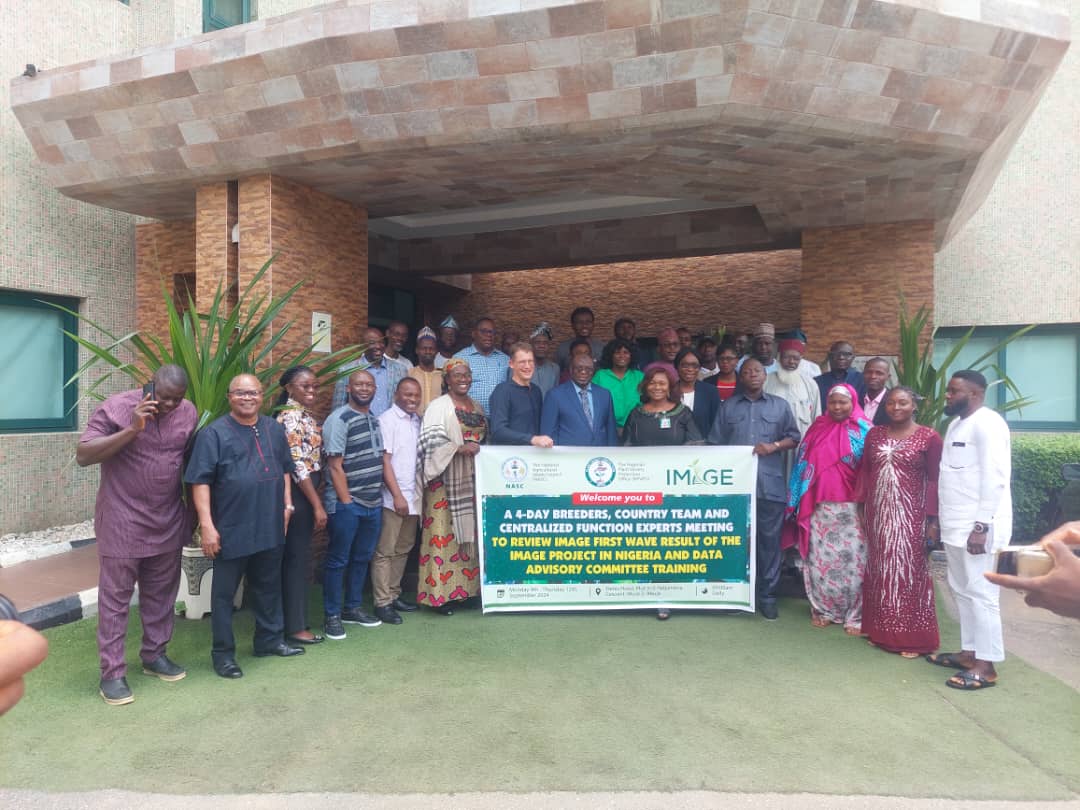
- …Stresses the importance of genetic diversity in agriculture
- …Advocate for improved genetic reference libraries
Experts in the agricultural sector on Monday, emphasized the need for harmonization of gene banks in Nigeria to enhance the country’s agricultural productivity.
The call was made at the opening of a 4-day Breeders Country Team and Centralized Function Expert Meeting, organized by the National Agricultural Seeds Council (NASC) in collaboration with the Nigerian Plants Variety Protection Office (NPVPO) amongst other partners.
The meeting aimed to review the first wave results of the Institutionalizing Monitoring of Crop Variety Adoption using Genotyping (IMAGE) project, which seeks to improve crop productivity and enhance genetic diversity in Nigeria.
Speaking to newsmen, Dr. Ishiak Khalid, Acting Director-General of NASC, stressed the importance of harmonizing gene banks to support the country’s agricultural development.
He said; “Harnessing the potential of our genetic resources requires a coordinated approach. By harmonizing our gene banks, we can ensure that our research institutions are working together to develop improved crop varieties that meet the needs of our farmers.”
Dr. Khalid encouraged research institutions to prioritize research on improved seed varieties, highlighting its impact on farmer yields. He praised plant breeders and crop experts for their achievements, stating that their expertise and commitment have been instrumental in driving agricultural progress.”
Also speaking, Prof. Lucky Omoigui, Seed System Specialist from the International Institute of Tropical Agriculture (IITA), stressed the crucial role of quality seeds in boosting crop productivity.
“Quality seeds are the backbone of productive agriculture, and to increase crop yields, we must ensure farmers receive seeds with the right genetic material. This requires rigorous testing and verification against reference materials.”
Omogui further emphasized the importance of maintaining robust seed banks. he said “A well-managed seed bank is vital for preserving genetic diversity and ensuring seed quality. Continuous use of seeds without replenishment from reserves leads to quality degradation.”
Meanwhile Dr. Folarin Sunday Okelola, Acting Registrar of the Nigerian Plant Variety Protection Office (NPVPO), presenting a paper titled “Crop Survey Results: Nigerian Cassava, Revised Genotyped Crop Survey based on the Cluster Pipeline Bioinformatics Pipeline.” reiterated that the essence of the meeting is to adopt and advise farmers on effective seed systems.
Okelola urged stakeholders to consider opportunities for improving access to quality seeds, maintaining seed purity, enhancing genetic reference libraries, and conducting analysis to characterize genetic entities and unidentified samples
According to him, ongoing and regular analysis based on growers’ reports and genetic features will help understand what farmers are planting.
He however, encouraged research institutions to conduct further studies to comprehend genotyping and the clustering pipeline, which can be effectively applied in dynamic seed systems with uncontrolled variation in outcrossing crops, where genetically diverse Open-Pollinated Varieties (OPVs) predominate.
-

 Business14 hours ago
Business14 hours agoOkpella Monarch: Obaseki Ratified Kingmakers Decision, End 5years leadership Vacuum
-

 Banking10 hours ago
Banking10 hours agoFree Food Saga: Akpabio quoted out of context-CSO
-

 Foreign15 hours ago
Foreign15 hours agoSci-tech innovation fuels China’s high-quality development
-

 Entertainment7 hours ago
Entertainment7 hours agoDavido Declares ‘Timeless’ His Best Album
-

 Entertainment7 hours ago
Entertainment7 hours ago‘Adire’ Secures Four Nominations at the Best of Nollywood Awards
-

 Business7 hours ago
Business7 hours agoWike Urges Nigerians to Pay Taxes for Improved Social Services
-

 Foreign9 hours ago
Foreign9 hours agoQinling Mountains better safeguarded with comprehensive digital platform
-
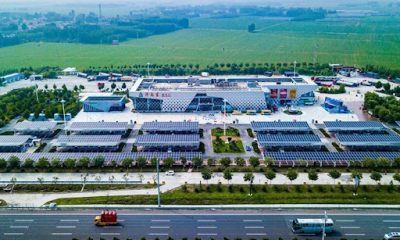
 Foreign9 hours ago
Foreign9 hours agoExpressway service station in Shandong achieves carbon neutrality

